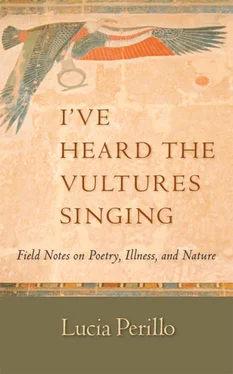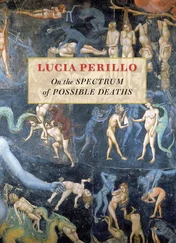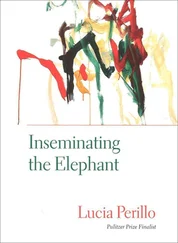Times like this, I curse the human race.
But when the dog is gone, the gulls assemble again, feinting toward each other with their yellow beaks and shivering tongues. How you make gulls compelling, I discover, is by summoning them. No doubt bread is bad for a wild animal’s digestive system — I once worked for the U.S. Fish & Wildlife Service, I know this — and I shouldn’t be encouraging these gulls in more beggarly habits than they already own. But any rush of power is amplified to a person who can’t help feeling powerless, and I can’t resist convening them, my hundred Roman citizens. Whose names at last I think I know, though I am probably wrong.
Sometimes I call myself cripple , a word that comes from the Old English creopan , meaning “to go bent down.” So, etymologically, cripples are creepy. Our bodies house the worst sort of luck, and I would bet that most people are afraid to see themselves in the bent form’s mirror — as if bad body-luck were contagious and traveled via the eye-beams, a belief that seems somehow intuitively logical. Even though my own animal fortune has packed its bags and headed south, I’m not immune to a hitch in my swallow whenever I cross paths with the likes of me.
As a member of the population to which the word applies, though, I’m given some latitude in my use of cripple as an aggressive form of self-description. In doing so I may intend to suggest that I have become hardened to its connotations, or that I am a realist about my body’s state, or that I am using the word to announce my affinity with a subculture that aspires to outlaw status. Each of these meanings enshrines some sort of little fib. As in the obvious fact that my outlaw status is belied by my helplessness, which causes any swaggering to possess a tinge of pathos. If I tried to swagger, I would fall down.
Because cripple is one of those somewhat archaic words that describes a population conventionally seen as oppressed, it now comes off as a slur when spoken in the company of upright citizens. We all know such words, slurs that are mainly racial and that take on a showboat quality when they come from the mouths of their intended targets. Even the word nigger , which has been called “the nuclear bomb of racial epithets,” has had some air added to its final syllable and, in that inflated pronunciation, was turned into a shield by black comics and rap singers of the late twentieth century — they held up the shield and stood behind it. Would it have been more courageous for them to have stood without the shield? Now when it crops up in the news, in some recapitulation of its deliverance, it gets coded as the N-word , as a way of clarifying intention, of saying I am not a racist even though the expression the N-word is cloying, pathetic.
Perhaps it is the weak who take most pleasure in damning themselves, a sophomoric way of plumping up the pillow of the ego. While I was a cowering child I fell in love with the words wop, dago , and guinea , because Italians were the gladiators of my town, where we were not an insignificant minority — the vowels in our last names clanked like armor. I was not tough, only half a dago, but thought some metal might flake off the words and adhere to me. And so I rehearsed them with abandon. When I mentioned this the other day to a man who was born in Italy, he looked at me with horror and pity as he poured a drop of anisette into his espresso’s tiny cup.
Dago from the Spanish for James, Diego —somehow the nationalities got swapped around. The derivation of wop is more murky: it could mean dandy , or could mean sour wine. Guinea from Guinea Negro , a linkage between Africans and people from southern Italy, forged by the dark skin I don’t possess. This was the name we loved best, the one that alluded to the coveted brown tint — the darker the skin, the more status attached, dark people being exotic, rare, associated with danger. Guinea! we yelled as we pushed each other off the floating dock and into the toxic river, in which we guineas were not afraid to swim, though I sometimes wonder if those poisoned waters were what damaged my immune system, causing it to attack my brain.
To me it seems illogical that a word should be permitted to some people and not to others. The problem is intention, I suppose, the assumption being that a member of a community can use an old (corroded by time, or cruel history, to now become appalling) label in a manner that expresses brotherhood while at the same time armoring the community against those who would besiege it. The intentions of outsiders, on the other hand, can’t be so easily trusted. This assumes that the distinction between insider and outsider is easy to make: we need to know skin tone or the number of vowels in a name. The urban accent or the wheelchair. To get permission to say cripple , I have to let people see me. And I don’t like people to see me. This is the beauty of words, how they allow speech without having to be seen. So cripple leads to a conundrum: I have to be seen/I don’t want to be seen.
The word also has an antique feel, like a butter churn, like some remnant of the vocabulary of grandparents from the Old World. To make the label more aggressive, and maybe chummier, the brotherhood of those foiled by bad body-luck sometimes shortens it to crip , as in: the crip community. Never having been much of a club-joiner, however, I find myself too aloof for the bonhomie of crip.
My friend Marva, whose family calls her gimp , says that this name did sting at first, though she assumes they use it to assure her she’s not being pitied. When she asked what I am called, I realized that my family doesn’t call me anything. They do not refer to my condition , not wishing to appear ill-bred. Earlier in my disease they were probably as stunned and stymied as I was — and in those days it seemed possible to evade the body if we simply did not speak of it. This was a proven tactic, which had served us well in regard to sex.
Now, when backed into a corner, my family calls me disabled , the static electricity clumping into quotation marks around the word. Disabled isn’t cloying exactly, though it does strike me as overly sanitized in its depiction of a state that is so oftentimes a mess.
My dislike for disabled comes from its being cobbled together from negation: not able, like in -valid. I cling to the fantasy that I could do anything with the right technology, which only the economies of scale have worked against — by now there ought to be some kind of robotic superstructure to stand me up and walk me. Or a lightweight jetpack (because as early as the mid-1960s Bell Aerosystems had invented barrels and chairs that flew, all this technology prior to the electronic age that shrunk the phone booth into something smaller than a cigarette pack). One can only assume that the fear of litigation halted the development of jetpacks or electric bones that would let the cripples march.
There it is again, the word. In your face we say of people who like to invade social boundaries. All my life I have had trouble with being able to correctly gauge the boundary’s circumference — I think I suffer from a mild form of dyslexia that has waltzed me through a life of blunders. Describe me , I asked my friend Vivian, who also calls herself a cripple. She taught art at the Wa He Lut Indian School, where a girl born with fetal alcohol syndrome once asked fearfully: What’s wrong with you?
When Vivian asked what she meant, the girl said: I mean how you’re crimpled.
Читать дальше











![Various - Birds and Nature, Vol. 12 No. 5 [December 1902]](/books/745517/various-birds-and-nature-vol-12-no-5-december-thumb.webp)
![Various - Birds and Nature Vol. 11 No. 2 [February 1902]](/books/745533/various-birds-and-nature-vol-11-no-2-february-1-thumb.webp)